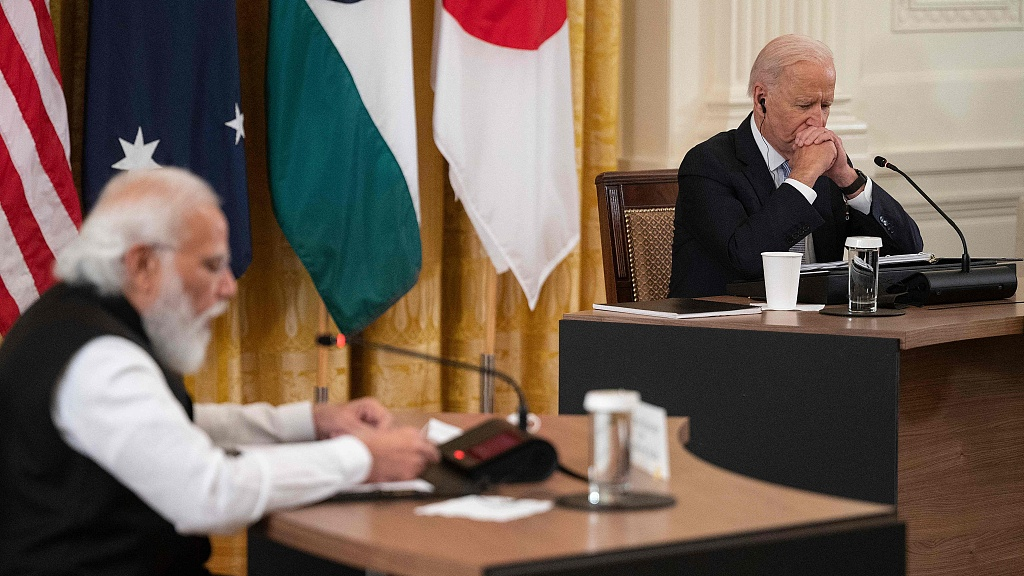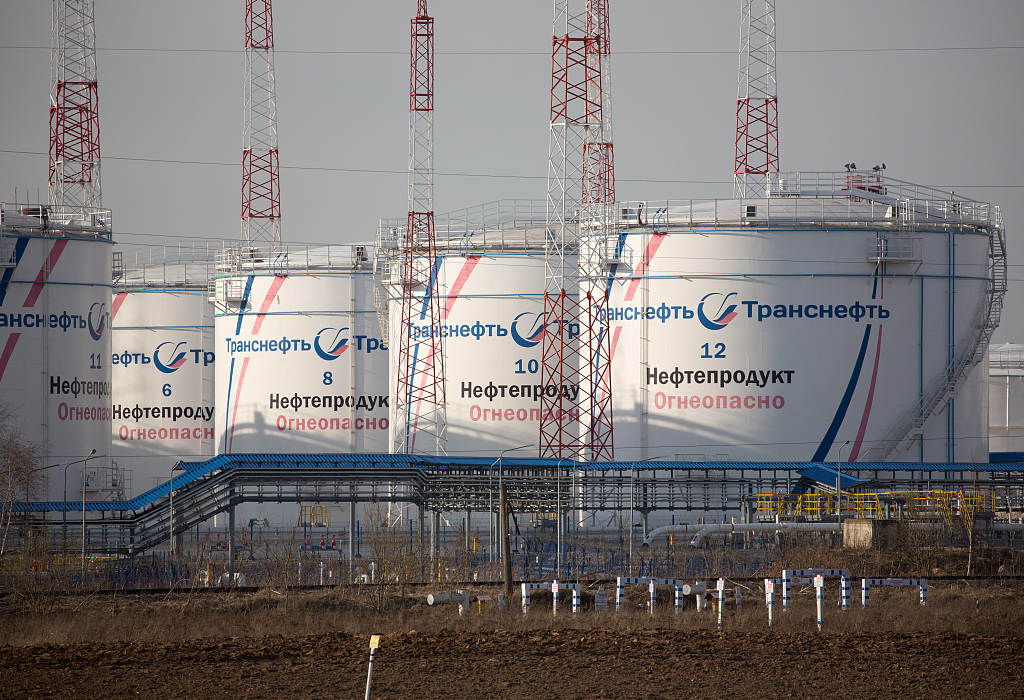
U.S. President Joe Biden listens as India Prime Minister Narendra Modi (L) speaks during a Quad Leaders Summit at the White House in Washington, D.C., U.S., September 24, 2021. /VCG
U.S. President Joe Biden listens as India Prime Minister Narendra Modi (L) speaks during a Quad Leaders Summit at the White House in Washington, D.C., U.S., September 24, 2021. /VCG
Editor's note: Stephen Ndegwa is a Nairobi-based communication expert, lecturer-scholar at the United States International University-Africa, author and international affairs columnist. The article reflects the author's opinions and not necessarily the views of CGTN.
The dispatch from the White House on United States President Joe Biden's virtual meeting with Indian Prime Minister Narendra Modi on April 11 contained the usual diplomatic agenda. However, experts view the main focus of the meeting as an attempt by Biden to push back against Modi's apparent independence in the ongoing Ukraine-Russia war.
Biden's diplomatic overtures to India seem to be hitting feverish levels, with the Monday meeting coming only a month after he held a Quadrilateral Security Dialogue (Quad) Leaders' virtual meeting on March 3 with the group's leaders comprising India, Australia and Japan. The Monday meeting was also a precursor to the so-called U.S.-India 2+2Ministerial Dialogue between U.S. secretaries of state and defense, and India's external affairs and defense ministers.
The U.S. has reason to be insecure. India has not behaved according to script on the Ukraine crisis. Amid the superpower's pontifications, India has actually increased its uptake of Russia's oil after the announcement of the sanctions, in a move that has brought great savings to India through massive discounts. This is definitely an unnerving development to the West as it cannot tell exactly where Modi's allegiances lie.
It is curious that the U.S. and other Quad members are reportedly comfortable with India's stance of non-condemnation of Russia for the war. For delicate strategic reasons, none of the countries wants to rub India the wrong way right now, and are handling the country with gloved hands.
By refusing to enter the West's echo chamber, India has taken an isolationist approach in its foreign policy toward the crisis. Furthermore, it is sending a message that the Russia-Ukraine war should be handled politically and diplomatically.
But the West is obviously paranoid since Modi's body language resonates with that of some countries like China and others who have either abstained or voted against anti-Russia resolutions at various United Nations meetings on the crisis.
The underlying intention for this rather crucial meeting between the two leaders must have been Biden's pulling back India from his entrenched and long-standing relations with Russia. But the meeting was an anti-climax for the U.S. as India refused to be pushed to the wall or blackmailed on the Ukraine crisis.
Modi definitely understood Biden's selfish intentions. He did not give any commitments on joining Russia's lynch mob. Neither did he give in to Biden's increasing pressure of avoiding the purchase of Russia's oil or accepting the U.S.' offer of a better oil deal.

Oil storage tanks at the Volodarskaya line operation dispatcher station, operated by Transneft PJSC, in Konstantinovo Village, near Moscow, Russia, April 7, 2020. /VCG
Oil storage tanks at the Volodarskaya line operation dispatcher station, operated by Transneft PJSC, in Konstantinovo Village, near Moscow, Russia, April 7, 2020. /VCG
India would without doubt be a game-changer if it played ball on isolating Russia. Both countries are engaged in a "special and privileged strategic partnership," a relationship comparable to, for instance, that of the U.S. and its closest ally the United Kingdom.
In a speech delivered by former Indian Foreign Secretary Ranjan Mathai in Russia, the five major components of Indo-Russian partnership include culture, defence, civil nuclear energy, anti-terrorism co-operation and space.
In addition to oil, Russia is the biggest supplier of military hardware to India, which accounted for 46 percent in 2021. India's main exports to Russia include pharmaceuticals and telecom instruments. Both countries also share membership of key international organizations including the UN, the BRICS grouping of top developing countries, the Group of 20 and the Shanghai Cooperation Organization.
Experts also observe that there is little chemistry between Biden and Modi, compared to the latter's relationship with former President Donald Trump. Modi also had a cordial relationship with former President Barack Obama, who made two visits to India during his two-term presidency. There could be a slight possibility that either Trump or Obama would have managed to persuade – not coerce – Modi to their point of view. As it is now, Modi is highly unlikely to have a change of heart toward Russia's President Vladimir Putin, one of his closest allies.
With Modi reiterating his oft repeated appeal for Putin to hold dialogue with Ukrainian President Volodymyr Zelenskyy, he avoided Biden's trap of antagonizing Putin. India's principle on what it believes is right in the current predicament is setting a precedence of courage for other countries that find the global balance of power unfair and untenable.
(If you want to contribute and have specific expertise, please contact us at opinions@cgtn.com. Follow @thouse_opinions on Twitter to discover the latest commentaries on CGTN Opinion Section.)

